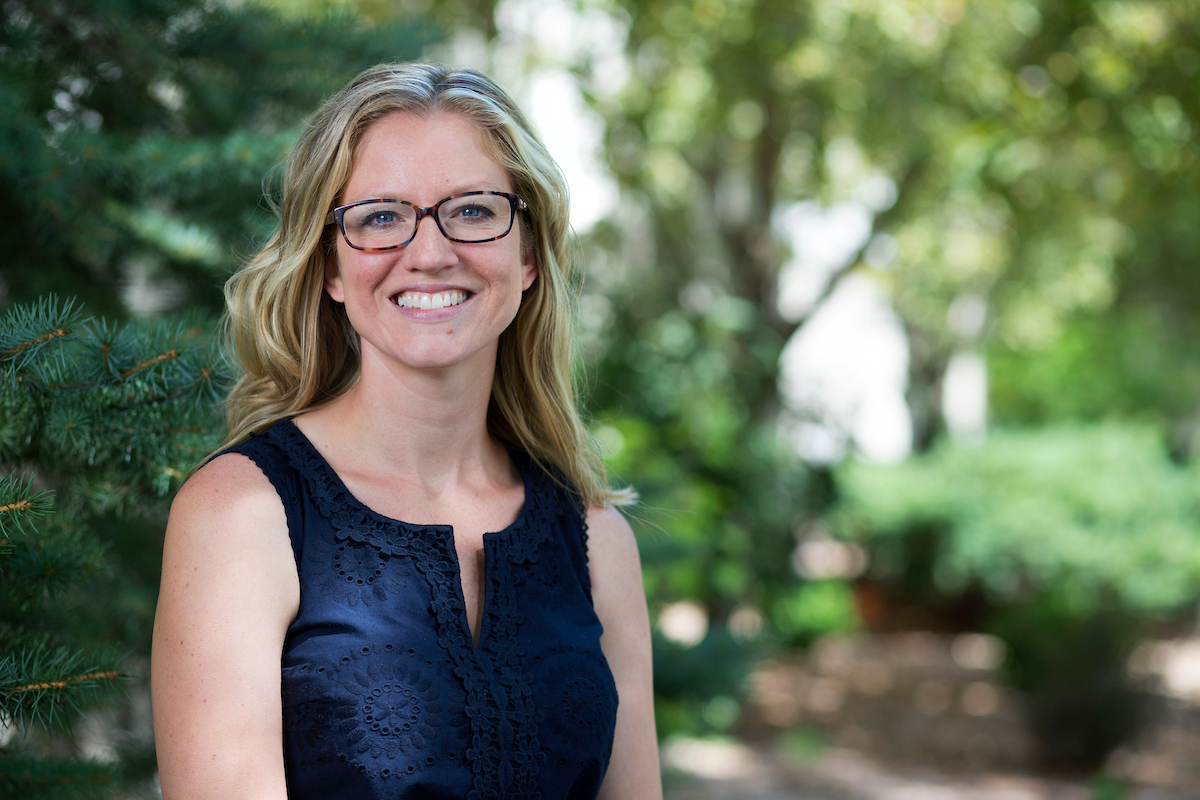
Amie Zarling, associate professor of human development and family studies. Larger image. Photo by Christopher Gannon/Iowa State University.
AMES, Iowa — We all know that small habits, like washing our hands and eating fruits and vegetables, are good for our short- and long-term health. But many of us are in the dark when it comes to happiness. We tend to view this emotion as something we don’t have much control over. Or we fixate on distant milestones and achievements. Once we get X, we will be happy, we tell ourselves.
Amie Zarling, associate professor in human development and family studies at Iowa State University, wants to change this. She points to studies that suggest about 40-50% of our happiness is based on genetics while 10% is related to circumstances like income, appearance and where we live. That means the rest is something we can manage with practice.
“Happiness is really something you need to work for, and it’s based on small habits that you integrate into your life over time. It’s not a quick fix,” says Zarling.
With this in mind, she developed The Science and Practice of Happiness, a new course at Iowa State. Over 80 students from different majors across campus signed up for the inaugural semester. Zarling says she wanted to create something that would help students apply principles, strategies and research to their own lives, while at Iowa State and beyond.
“A lot of jobs and careers are stressful, and learning how to manage that stress and be resilient can help people, especially in those high-demand careers, like teaching, nursing, social work and health-related careers, which can have a lot of burnout,” says Zarling.
The class kicked off the semester by discussing the differences between happiness and well-being.
“You can do things that give you that feeling of happiness, but it tends to be fleeting. Balancing it with more of those investment-type behaviors, like building relationships and finding meaning and purpose in your life, provide a more stable sense of peace, contentment and meaning, which provide well-being,” says Zarling.
Since then, the class has focused each week on a different aspect of happiness or well-being, including gratitude, social connections and mindfulness. Zarling underscores that each skill or strategy discussed is backed by research. She encourages students to try all of them to discover which are the most effective in their own lives and situations.
In the classroom
During a recent class, Zarling introduced ‘savoring,’ a type of mindfulness. She explained it’s about paying extra attention to a positive emotion. This could include focusing on the tastes, textures and colors of a meal, remembering a joyful moment with family or envisioning what your upcoming beach vacation will look and feel like.
“The research on savoring has exploded in the past five years,” said Zarling. “Children who are good at savoring tend to report greater wellbeing. Research shows savoring can benefit relationships, especially long-distance relationships.”
Zarling emphasized that this process — noticing, intensifying and relishing a positive emotion — is not the same as positive thinking or trying to find a silver lining. Rather, savoring provides a counterbalance to other emotions that are negative.
She walked the students through an exercise to practice the technique before they split into small group discussions.
“I never knew you could teach a whole class about happiness, but I’ve enjoyed learning about all the different aspects and the science behind it,” says Jack Hennen, a senior in biology. “I've definitely been trying to incorporate active gratitude into my daily life and reflect on it when I come back to class.”
Next to Hennen, John Gidley, a senior in kinesiology and health, nodded.
“I decided to take the class because I felt like it was an elective you could actually apply to your life, and the class has made me realize more the importance of making time for relationships and appreciating those relationships, rather than always prioritizing work or school over them,” says Gidley. “Now if someone asks if I want to grab coffee, I’m much more likely to take them up on it.”
Other students, like Lyndsie N. Byers and Haylee De Nubila, both juniors in human development and family studies, echoed this sentiment and added that they appreciate Zarling’s teaching style and openness. During the class, Zarling said she struggles with the savoring behavior. As the mother of three young children, it can be difficult to sit down and enjoy a meal, but it’s something that she wants to continue practicing and working toward.
Looking ahead
As the semester progresses, the class will cover self-compassion, finding meaning and purpose, forgiveness and helping others. Other departmental faculty, including University Professor Peter Martin, the Ruth Whipp Sherwin Endowed Professor Jonathan Fox and teaching professor Amy Popillion will present their research on centenarians, finances and happiness, and the importance of relationships and social connections, respectively. Ragen Chastain, a speaker and writer coming to Iowa State later this month, will also discuss the science behind weight stigma and body positivity in Zarling’s class.
For their final projects, students will reflect on what they’ve learned, share why certain strategies were more effective than others and lay out a plan for integrating happiness habits going forward.
Zarling plans on offering the class each fall and spring semester.